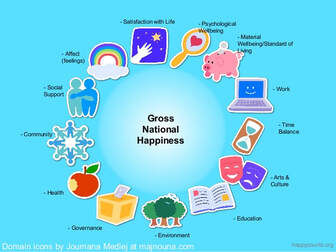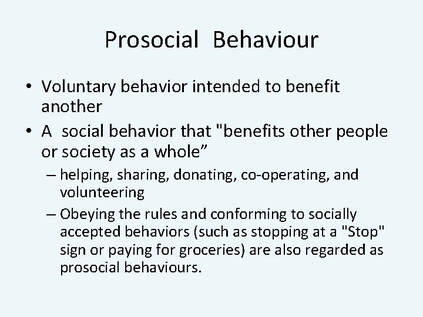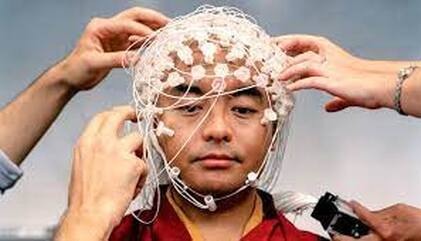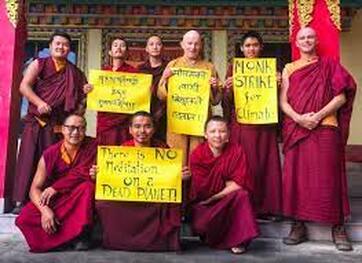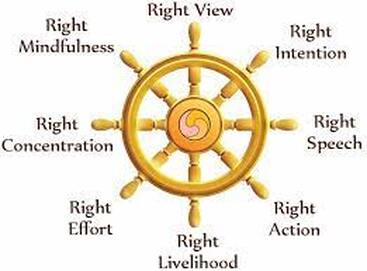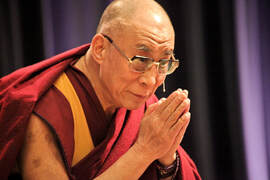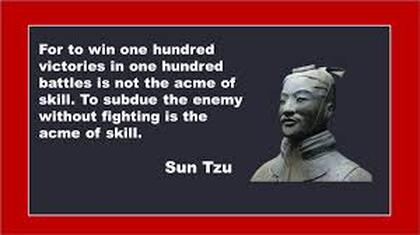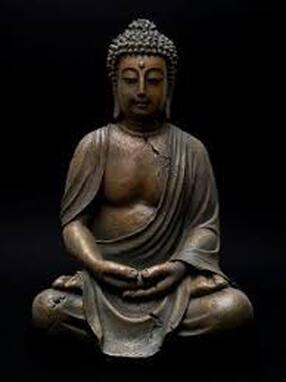Ten Study Topics to Continue the Discussion
Once we grasp the enormity of the issues facing American society in particular, and the world in general, it is easy to become paralyzed, confounded, even passive. And yet, for those of us with enough commitment and altruism, we can find the energy and inspiration we need if we begin to problem solve together. The approach I am adopting is that of taking the principles of both Cognitive Behavioral Therapy and Buddhist practice, philosophy, and medicine, and applying them to our political thinking. Once we begin to see the unhealthy core beliefs, or what Buddhists call 'misperceptions of reality,' in our political philosophy, then the way to diagnosis and treatment become far more apparent.
It seems to me that there is a great deal of work we have to do in identifying how the beliefs of the political parties are formulated, and then how these ideas are massaged into messaging, party platforms, and policies that become laws of the land. We also need to ask which ideas are closer to scientific truth, as we discover more about human psychology and behavior, and which ideas also best articulate the collective wisdom of the world's great civilizing traditions, known as the 'perennial philosophy.' The best way to do this, I believe, is through group study, taking the philosophy animating the given political party, analyzing it, seeing how it manifests in lawmaking, and then asking, "Are we seeing toxic effects in society from laws which are toxic in their fundamental assumptions about reality?"
There are a number of good books and websites on the Resources Page that can help drive discussions. As I wrote in my article, "When Your Child Has Eco-Anxiety, Don't Give Up," the division of the basic functions of mind given by Yongey Mingyur Rinpoche into Wisdom, Compassion, and Awareness, is useful for breaking down these huge topics of interest into more digestible parts. So, for example, when we look at the philosophical principles, many of them flawed, behind the Republican, and Democratic, party's policies, we are exercising our wisdom, in the sense that we call on our highest powers of intelligence and insight to ask whether there are better ways to reduce collective suffering in the world. This is how we can build the bridges across cultural divides and create a more unified sense of community.
When we discuss the value of compassion, and how it brings both personal happiness and an increased sense of community feeling, then we are exercising the higher expressions of our social-emotional intelligence. When we talk about awareness in the social, economic, and political spheres, we are pointing out that we need truly enlightened leadership to help make a more enlightened political vision become reality. We need leaders to be self-aware, and willing to invest years of their lives into spiritual, ethical, and psychological training, along with the other traditional education needed.
Once armed with this critical thinking, we can then begin to come up with creative ideas about how to go about clarifying this vision of cross-fertilization between the modern science of human happiness and the perennial wisdom of the world's great spiritual traditions. I have suggested elsewhere that our modern, more enlightened philanthropists could endow an X-Prize given to that team of researchers who makes the greatest case for a new political and economic philosophy, rooted in science and the profound ethical values of the wisdom traditions. I can also foresee academies of political training that first concentrate on developing the inner character and moral and awareness true leaders need.
And then there is the monumental task of creating the 'beloved community' that Martin Luther King, Jr. envisioned. How do we use our best social-emotional skills, our loving kindness and compassion, to reach out to those different from us? How do we truly make a bigger tent? This community would embrace the new political vision, and support the leaders who represent it. But they would also help to create a better society through working on themselves. Perhaps a small cohort in the beginning, but one with its eyes always on the absolute unity of sentient beings, the realization that we are all in this boat together.
It seems to me that there is a great deal of work we have to do in identifying how the beliefs of the political parties are formulated, and then how these ideas are massaged into messaging, party platforms, and policies that become laws of the land. We also need to ask which ideas are closer to scientific truth, as we discover more about human psychology and behavior, and which ideas also best articulate the collective wisdom of the world's great civilizing traditions, known as the 'perennial philosophy.' The best way to do this, I believe, is through group study, taking the philosophy animating the given political party, analyzing it, seeing how it manifests in lawmaking, and then asking, "Are we seeing toxic effects in society from laws which are toxic in their fundamental assumptions about reality?"
There are a number of good books and websites on the Resources Page that can help drive discussions. As I wrote in my article, "When Your Child Has Eco-Anxiety, Don't Give Up," the division of the basic functions of mind given by Yongey Mingyur Rinpoche into Wisdom, Compassion, and Awareness, is useful for breaking down these huge topics of interest into more digestible parts. So, for example, when we look at the philosophical principles, many of them flawed, behind the Republican, and Democratic, party's policies, we are exercising our wisdom, in the sense that we call on our highest powers of intelligence and insight to ask whether there are better ways to reduce collective suffering in the world. This is how we can build the bridges across cultural divides and create a more unified sense of community.
When we discuss the value of compassion, and how it brings both personal happiness and an increased sense of community feeling, then we are exercising the higher expressions of our social-emotional intelligence. When we talk about awareness in the social, economic, and political spheres, we are pointing out that we need truly enlightened leadership to help make a more enlightened political vision become reality. We need leaders to be self-aware, and willing to invest years of their lives into spiritual, ethical, and psychological training, along with the other traditional education needed.
Once armed with this critical thinking, we can then begin to come up with creative ideas about how to go about clarifying this vision of cross-fertilization between the modern science of human happiness and the perennial wisdom of the world's great spiritual traditions. I have suggested elsewhere that our modern, more enlightened philanthropists could endow an X-Prize given to that team of researchers who makes the greatest case for a new political and economic philosophy, rooted in science and the profound ethical values of the wisdom traditions. I can also foresee academies of political training that first concentrate on developing the inner character and moral and awareness true leaders need.
And then there is the monumental task of creating the 'beloved community' that Martin Luther King, Jr. envisioned. How do we use our best social-emotional skills, our loving kindness and compassion, to reach out to those different from us? How do we truly make a bigger tent? This community would embrace the new political vision, and support the leaders who represent it. But they would also help to create a better society through working on themselves. Perhaps a small cohort in the beginning, but one with its eyes always on the absolute unity of sentient beings, the realization that we are all in this boat together.
1. Gross National Well-Being vs. Gross Domestic Product
In the last year, three Prime Ministers, all women, have come forward with their plans to reinvision their government’s policy goals to reflect a primary concern for their citizens’ well-being, and place measurements such as GDP in a secondary role. In a recent article in Vox, Jacinda Ardern, the Prime Minister of New Zealand was profiled, as well as her policy of focusing on societal well-being. The article points out:
To Prime Minister Ardern, the purpose of government spending is to ensure citizens’ health and life satisfaction, and that — not wealth or economic growth — is the metric by which a country’s progress should be measured. GDP alone, she said, “does not guarantee improvement to our living standards,” nor does it “take into account who benefits and who is left out. |
Nicola Sturgeon, the Prime Minister of Scotland, did a timely TED talk about shifting our priorities as nations towards national goals of happiness and health. Sturgeon, and Ardern from New Zealand, and the Prime Minister of Iceland, Katrin Jakobsdottir, are all calling for the same realignment of national goals. What is fascinating is that we now have a world where leaders are actually talking about reorganizing our thinking to consider human nature and its happiness as the focus for political policy. This is obviously also in sync with much of what the Nordic countries have been striving to accomplish, creating durable and sustainable safety nets, for children, parents, seniors, those who lose a job, and putting brakes on the insatiable desire to accumulate wealth. As Sturgeon notes in her talk,
Of course, these leaders were preceded in their efforts by the Bhutanese King, Jigme Singye Wangchuck, who instituted the concept of Gross National Happiness, beginning in the 1970’s. In time, scientists from around the world started researching well-being from country to country, and came up with many other indices of health and happiness, such as the World Happiness Report, the Happy Planet Index, 2014 Gallup Positive Experience Index, the Gallup Global Well-Being research project, the General Social Survey, the WHO’s World Mental Health Initiative, the OECD Better Life Index, Canadian Index of Well-Being, Global Happiness and Well-Being Report. Clearly researchers are seeing that the conventional, and dogmatic blind faith in economic prosperity as the answer to all of humanity’s suffering is being questioned at a core level.
It is telling that Americans, according to all these indices, have significantly less well-being, happiness, work-life balance, and other quality-of-life metrics, than most developed countries.
Of course, these leaders were preceded in their efforts by the Bhutanese King, Jigme Singye Wangchuck, who instituted the concept of Gross National Happiness, beginning in the 1970’s. In time, scientists from around the world started researching well-being from country to country, and came up with many other indices of health and happiness, such as the World Happiness Report, the Happy Planet Index, 2014 Gallup Positive Experience Index, the Gallup Global Well-Being research project, the General Social Survey, the WHO’s World Mental Health Initiative, the OECD Better Life Index, Canadian Index of Well-Being, Global Happiness and Well-Being Report. Clearly researchers are seeing that the conventional, and dogmatic blind faith in economic prosperity as the answer to all of humanity’s suffering is being questioned at a core level.
It is telling that Americans, according to all these indices, have significantly less well-being, happiness, work-life balance, and other quality-of-life metrics, than most developed countries.
Study Topic: So what questions does this raise for you, and your circle of friends and family? Do you feel that it is hopeless to change the juggernaut of American materialism and focus on accumulation of wealth? How can small groups link up with each other, and start to articulate a demand for re-evaluating our priorities as a nation?
IF YOU HAVE INTEREST IN THE CHARLOTTESVILLE ECODHARMA STUDY GROUP, WORKSHOPS, AND NEWSLETTER, PLEASE FILL OUT THE SECOND FORM BELOW. THANK YOU!
2. How Can Government Encourage, or Discourage, Unselfish Prosocial Behavior?
Buddhism has long maintained the cultural and spiritual importance of inculcating ethical and moral behavior in society. The theme of how unselfish and compassionate behavior brings good merit and happiness, as well as more peaceful relations in society, is repeated at all levels of education, beginning with teaching children the tales of the Buddha’s past lives and how he was kind to all beings.
Modern science is validating these principles through research done in experimental gaming and the science of conscience. Professor Lynn Stout outlines findings from behavioral scientists in her article, on the website Evonomics: “How Economists Turned Us Blind to Our Own Goodness: Cultivating conscience: how good laws make good people.”
She notes:
Buddhism has long maintained the cultural and spiritual importance of inculcating ethical and moral behavior in society. The theme of how unselfish and compassionate behavior brings good merit and happiness, as well as more peaceful relations in society, is repeated at all levels of education, beginning with teaching children the tales of the Buddha’s past lives and how he was kind to all beings.
Modern science is validating these principles through research done in experimental gaming and the science of conscience. Professor Lynn Stout outlines findings from behavioral scientists in her article, on the website Evonomics: “How Economists Turned Us Blind to Our Own Goodness: Cultivating conscience: how good laws make good people.”
She notes:
By manipulating social variables like instructions from authority, beliefs about others’ behavior, and perceptions of benefits to others, researchers have been able to dramatically change the behavior of human subjects in experimental games. When the social cues favor prosociality, behavioral scientists can elicit universal or near-universal unselfishness. Conversely, when subjects are told to act selfishly, believe others would act selfishly, and believe selfishness is not too costly to others, they exhibit near-universal selfishness. |
Study Topic: This research coming from the field of behavioral economics calls into question what is the nature of the social contract in the United States. As Jean-Jacques Rousseau made clear, the agreement between a nation's people and its government is dependent on the exchange of services and commitment. The government provides security and national services like health, education, and infrastructure, and the people provide agreement to obey laws, pay taxes, sometimes perform military or civil service, and so on.
But what about the deeper implications of the research cited above? Is it not incumbent on the educational policy of governments to ensure that education is designed to listen to modern science? Don't we want citizens to not only be involved but also educated to have a conscience, to work for the greater good, to realize the scientific truth that we are all connected in one ecosystem?
3. How Buddhism Has Influenced Western Psychology
According to Arthur Koestler, “All decisive advances in the history of scientific thought can be described in terms of mental cross-fertilization between different disciplines.”
According to Arthur Koestler, “All decisive advances in the history of scientific thought can be described in terms of mental cross-fertilization between different disciplines.”
|
The confluence of Western psychology with Buddhism has produced major advances in our understanding of the human psyche. In the past five decades, hundreds of studies were inspired by the dynamic merging of these streams of thought. Neuroscientists confirm the remarkable brain states of advanced meditators. Mindfulness practices have revolutionized stress and pain management. Buddhist meditations helped us discover the power and benefits of visualization. We now have a deeper sense of what role spirituality, or sense of purpose, plays in mental health. This process also led us to a new appreciation for self-compassion, a new lens for cognitive therapy, and new treatment for some major mental disorders. This research has transformed our prior notions of human happiness. |
Study Topic: In my article on Eco-anxiety I argue that the three basic functions of mind, cited by Yongey Mingyur Rinpoche — Awareness, Wisdom, and Compassion, are essential to not only healing, but also to the kind of compass we need to create a more moral and spiritually-informed society. These principles are not dependent on beliefs about the Buddhist faith, but are observable in all ranges of human behavior.
Does it not make sense that the tradition which has so influenced Western psychology could also inform our social and political psychology? As Clair Brown points out in her book, Buddhist Economics, to move away from the greed and competition-driven economy, we must rely on higher principles of human interaction. And not only would this be better for a more equity-driven social structure, it also make us happier.
Does it not make sense that the tradition which has so influenced Western psychology could also inform our social and political psychology? As Clair Brown points out in her book, Buddhist Economics, to move away from the greed and competition-driven economy, we must rely on higher principles of human interaction. And not only would this be better for a more equity-driven social structure, it also make us happier.
4. Cognitive Flaws in Our Current Economic and Political Philosophy
As many articles on the website, Evonomics, point out, the underlying political philosophy of Free Market, neoliberal economics is riddled with cognitive fallacies. We are not homo economicus, simply out for ourselves and our self-interest. There is no Invisible Hand guiding the marketplace. Marginal productivity is a justification for the mass accumulation of wealth of those in privileged positions. A rising tide does not lift all boats.
As John Maynard Keynes said:
As many articles on the website, Evonomics, point out, the underlying political philosophy of Free Market, neoliberal economics is riddled with cognitive fallacies. We are not homo economicus, simply out for ourselves and our self-interest. There is no Invisible Hand guiding the marketplace. Marginal productivity is a justification for the mass accumulation of wealth of those in privileged positions. A rising tide does not lift all boats.
As John Maynard Keynes said:
The ideas of economist and political philosophers, both when they are right and when they are wrong, are more powerful than is commonly understood. Indeed, the world is ruled by little else. Practical men, who believe themselves to be quite exempt from any intellectual influences, are usually the slaves of some defunct economist. |
This is where we need to cultivate our discriminating wisdom. This process of questioning the underlying mindsets, assumptions, and cognitive fallacies beneath our current ideologies can help forge a new political vision, a necessity for broad social action. Philosophers like Mary Wollstonecraft and Simone de Beauvoir gave feminism intellectual clarity and strength. Enlightenment thinkers paved the way for the American and French revolutions. W.E.B. Dubois, Frantz Fanon, and Alain Locke lit the flame of Black civil rights. Mahatma Gandhi, inspired by Leo Tolstoy’s non-violence, conceived of satyagraha as a guide to Indian liberation.
Study Topic: It is no small enterprise to begin thinking about how to create a new political and economic philosophy. And perhaps it will best be done by teams. If engineers can finance an X-Prize to the first team to build a private-enterprise rocket to reach space, why don't we ask the progressive and more enlightened philanthropists in our communities to finance a similar "moon rocket" project?
Taking all the findings of the modern science of human happiness, the common ground of the world's wisdom traditions, and what is still valuable in the millennia-old Western tradition of political philosophy, why cannot we not forge a new vision for our governance?
Taking all the findings of the modern science of human happiness, the common ground of the world's wisdom traditions, and what is still valuable in the millennia-old Western tradition of political philosophy, why cannot we not forge a new vision for our governance?
5. Eco-anxiety: Symptom of a Society with a Faltering Moral and Spiritual Compass
One doesn’t have to look far to see the toxic effects of Donald Trump’s appearance on the American political stage. Psychotherapists around the country describe an alarming increase in mental health symptoms since the campaign of 2016 and his victory.
One doesn’t have to look far to see the toxic effects of Donald Trump’s appearance on the American political stage. Psychotherapists around the country describe an alarming increase in mental health symptoms since the campaign of 2016 and his victory.
|
The American Psychological Association reports “. . . 57% of Americans say the current political climate is a “very” or “somewhat” significant source of their stress, and close to half of Americans say the outcome of the election causes them stress.”
|
No one I know in either the therapeutic or spiritual communities is surprised. The evidence is abundant in our practices. Not only do we feel disenfranchised from the political process, we recognize it as morbidly sick. We agree with the liberal intelligentsia who decry the “moral rot” running deep in the Republican Party. On platform after platform we hear a chorus of pundits lamenting the lack of ethics in the Party, from Jeet Heer in The New Republic, to Paul Krugman, in The New York Times, to Eric Alterman, in The Nation, to Ted Morgan in Salon.
As the monks in Kathmandu say, "There is NO meditation on a dead planet."
As the monks in Kathmandu say, "There is NO meditation on a dead planet."
Study Topic: In your study group, ask yourselves, 'What is the connection between the disastrous mental health of young people and the direction our society is going? n course this is not a new argument and has been put forth by counter-cultural voices since ever. But the question needs to be brought to the town halls, and the back rooms of the political parties. Greta Thunberg's cry, "The house is on fire!," resonated throughout the world, but is it enough to scream in anger?
Yes, we need to pay attention, and that is what we are doing right now. But without the moral and spiritual compass of an enlightened political vision, community, and leaders, then the great tidal wave of effort required to change a society's direction will dissipate.
Human beings must have an alignment of their basic functions of awareness for a movement to have real power:
1. Awareness that there is a higher, more scientifically true way of making economic and political decisions;
2. Wisdom that can actually bring the science and ethical reasoning forward into cogent arguments; and
3. Compassion, that demonstrates that these people are genuinely concerned about their fellow beings, and are willing to prove that by working on themselves, and coming out of their silos.
Yes, we need to pay attention, and that is what we are doing right now. But without the moral and spiritual compass of an enlightened political vision, community, and leaders, then the great tidal wave of effort required to change a society's direction will dissipate.
Human beings must have an alignment of their basic functions of awareness for a movement to have real power:
1. Awareness that there is a higher, more scientifically true way of making economic and political decisions;
2. Wisdom that can actually bring the science and ethical reasoning forward into cogent arguments; and
3. Compassion, that demonstrates that these people are genuinely concerned about their fellow beings, and are willing to prove that by working on themselves, and coming out of their silos.
6. Need for a New Political-Economic Vision — or translating ‘Right View’ in Buddhist Tradition to Political Philosophy
One way to approach this huge and daunting project is to begin at the beginning, with the Eightfold Path, and the key philosophical principle of that path, right view. As the professor, Krishnan Venkatesh, writes in Tricycle:
One way to approach this huge and daunting project is to begin at the beginning, with the Eightfold Path, and the key philosophical principle of that path, right view. As the professor, Krishnan Venkatesh, writes in Tricycle:
What is right view, and why does the Buddha place it first in the eightfold path? |
If we agree that right view is the first step on the path to understanding the nature of karma, how thoughts and actions and results are all connected, and how misperceptions and misconceptions about reality lead to suffering, then it follows that this same critical mind and rigorous questioning, this same discerning vision, can illuminate the psychology of our political world. Can we see the actual chain of causation from wrong view of reality — the cognitive fallacies that politicians and their theorists entertain — to the suffering our current system is causing?
You can’t bring a knife to a gunfight. Perhaps even more critical is to begin to weave together a new political theory. Buddhist thought leaders and their allies should spearhead the development of a socio-political theory, a political philosophy, that can supplant the dominant neoliberal one. This new political philosophy would reveal the science behind a theory and ethic of well-being, and encourage the development of such a theory of eudaimonia, the Greek ideal of happiness and welfare. And to do that we must acknowledge what we are up against.
As mentioned briefly above, this new philosophy can be the vehicle that carries the whole change process forward, or to the quantum level we need to jump to. There has to be an intuitive, cognitive, and pro-social framework that we can always refer back to as our organizing principle, as our raison d’étre for doing what we are doing. We must be careful not to let it ossify into an ideology, but we can avoid that by insisting that this philosophy be always rooted in scientific advancement, be proven in the field of leadership and compassion.
7. Conscious Citizenship and Buddhist Psychology: Exercising the Three Basic Functions of Mind, Wisdom, Compassion, and Awareness
Wondering how to help? First, set an example. As uncomfortable as it may be, I contend that we have to embark on an extraordinary journey. This is a process to becoming a conscious citizen —a spiritual practitioner and an activist. We have to engage and commit to working on ourselves, and for humanity. We need to discover antidotes to our psychic poisons, and the liberating joy of awakening higher faculties of consciousness. Unless we do, we really have no basis, no understanding of the kind and depth of change our society needs. And by ‘society’ I mean not just the mental attitudes of individuals, but also the systemic belief systems locked in our political and economic philosophies.We have to see that there is a parallel process between healing ourselves and healing society. The same core issues of dysfunction we find in our personal psychology can be found in the collective psyche of a society. The toxic effects of racist beliefs in the individual are mirrored and, inevitably, reinforced and magnified when held collectively as social norms.
Wondering how to help? First, set an example. As uncomfortable as it may be, I contend that we have to embark on an extraordinary journey. This is a process to becoming a conscious citizen —a spiritual practitioner and an activist. We have to engage and commit to working on ourselves, and for humanity. We need to discover antidotes to our psychic poisons, and the liberating joy of awakening higher faculties of consciousness. Unless we do, we really have no basis, no understanding of the kind and depth of change our society needs. And by ‘society’ I mean not just the mental attitudes of individuals, but also the systemic belief systems locked in our political and economic philosophies.We have to see that there is a parallel process between healing ourselves and healing society. The same core issues of dysfunction we find in our personal psychology can be found in the collective psyche of a society. The toxic effects of racist beliefs in the individual are mirrored and, inevitably, reinforced and magnified when held collectively as social norms.
If we are enraged, disappointed, or aggrieved by the poor quality of our political leadership, then it falls on us to discover what real leadership looks like. If we expect our leaders to be of much, (much!), higher ethical standards, above corruption, historically literate, versed in the sciences of human nature, aware of the cognitive beliefs and fallacies underlying economic policies, then we ourselves have to get up to speed on these issues.
If it is our civic duty to understand the democratic process, then it follows that we ought to fathom the world view driving party policies.
If it is our civic duty to understand the democratic process, then it follows that we ought to fathom the world view driving party policies.
Let us see how Buddhist theory may be helpful. One of the foremost proponents of how to apply ancient Buddhist teachings to modern life is Yongey Mingyur Rinpoche. He identifies the healing power of the tradition as having three basic functions of the mind, all mutually dependent — wisdom, compassion, and awareness. The Buddhist teacher and psychotherapist Tara Brach calls them gateways to well-being and happiness. It seemed to me, if we adapted these principles to our diagnostic process of eco distress, it would help us see around the corner…
Discriminating wisdom. A clear analogue in Western psychology to the tradition of discriminating wisdom is the modality of cognitive therapy. This approach relieves psychological issues by helping clients discover unhealthy core beliefs about themselves, others, and the world. It parallels the practice of insight meditation, or the fearless self-inquiry into the unhealthy sense of self. Parents can introduce a discussion of this practice, and then ask, “How can we apply a similar method of critical thinking to the cognitive fallacies in our system of politics and economics?”
Practice of compassion and loving kindness. His Holiness the Dalai Lama once said:
Neuroscientist Richard Davidson at The University of Wisconsin, found advanced practitioners of loving kindness produce brainwave patterns and amplitudes simply not found in any other subjects. These meditators age more slowly, and handle pain more effectively. Thanks to neuroplasticity, even the scans of beginning meditators quickly show changes.
Exercising this function of mind not only enriches our connections to others, it is also helps us grasp what people need to be happy. Longevity research like the Harvard Study of Adult Development points to human interaction as a primary source of happiness. Global studies on well-being, such as the World Happiness Report, reveal the lie that material wealth equates increasing satisfaction.
Path of self-awareness. Training the mind brings awareness, not just of our faults, but also the discovery of our radiant, peaceful, innermost nature — that which never left us, and can never be taken away. By stilling the monkey mind we awaken dormant faculties, spoken of by all the world’s wisdom traditions. Recently, scientists at Duke University summarized the benefits of meditation as ‘increased subjective well-being, reduced psychological symptoms and emotional reactivity, and improved behavioral regulation.’
This mental-ethical discipline helps us appreciate the difficulty of developing virtue and character, and the need for genuine leadership. While Buddhism is laser-focused on self-awareness as a vital tool for personal and social development, very little is known in Western leadership training about enhancing these skills.
Exercising this function of mind not only enriches our connections to others, it is also helps us grasp what people need to be happy. Longevity research like the Harvard Study of Adult Development points to human interaction as a primary source of happiness. Global studies on well-being, such as the World Happiness Report, reveal the lie that material wealth equates increasing satisfaction.
Path of self-awareness. Training the mind brings awareness, not just of our faults, but also the discovery of our radiant, peaceful, innermost nature — that which never left us, and can never be taken away. By stilling the monkey mind we awaken dormant faculties, spoken of by all the world’s wisdom traditions. Recently, scientists at Duke University summarized the benefits of meditation as ‘increased subjective well-being, reduced psychological symptoms and emotional reactivity, and improved behavioral regulation.’
This mental-ethical discipline helps us appreciate the difficulty of developing virtue and character, and the need for genuine leadership. While Buddhism is laser-focused on self-awareness as a vital tool for personal and social development, very little is known in Western leadership training about enhancing these skills.
8. Leadership Training that Enlightens and Transforms the Individual
Knowledge about self-awareness and ethics could inform leadership training. When we realize how much effort it takes to be a conscious human being, we see that our politicians are never asked to show up in this way. They are never trained or tested in their character, their morality is often sold to the highest bidder. This realization reveals potential avenues for training young people to become tomorrow’s leaders.
With this in mind we can actually take motivated and gifted young people and give them the kind of spiritual, intellectual, and ethical training that will make them the kind of inspirational, brilliant and moral leaders we need. This is not exclusively Buddhist, of course. The ancient Greeks believed education should be about training in arete, the Greek ideal of character.
This new system of training political and judicial leaders will help them become more aware, informed, and ethical human beings. It will utilize the latest research from behavioral economics, neuroscience, and social psychology to provide a theoretical basis for leadership training. It will also gather, compare, and distill the collective knowledge from the wisdom traditions about how to educate the spirit, cognitive mind, and heart. This training would then be augmented by mentoring, specialized training in history and political science, and verified through systematic testing and evaluation.
Pure virtue, or arete, can be instilled through a combination of the right training, and the right candidate. We now have the science to train and measure someone’s character by a number of vectors, and we have the wisdom of the world’s spiritual traditions to give us the very best methods.
We can no longer assume that anyone who captures the attention of the Republican, or even the Democratic, Party is fit for office. Since politics controls the purse strings and decision making for this country, and because our society, and our planet, are in such a severe crisis, it follows that those who run for office should be trained, tested, and licensed before holding such great responsibility.
These principles must be embodied in the soul and character of our next-generation leaders — not just their intellectual abilities or their cunning. We must be even more ambitious — establishing schools to produce enlightened leaders who will profoundly change not only the conversation about politics, but the fruits of its exercise.
We have abundant evidence that money is corrupting American politics, in every possible way, from running a campaign, to the perks and benefits of being in office, to the promises of future wealth tangled in front of politicians in the form of lobbying positions or seats on corporate boards, to greater entrée into the world of high finance, tax havens, and the social connections that grease the business world.
The only reliable way we have to ensure that a politician is above reproach, is held to a higher moral and ethical standard, is by creating a new system of leadership training. We know from the social and neurosciences that we can effect changes in the personality, all the way to the level of the structure of brain cells, so why can’t we design a new educational methodology for leaders that puts them through such a rigorous, years-long course?
With this in mind we can actually take motivated and gifted young people and give them the kind of spiritual, intellectual, and ethical training that will make them the kind of inspirational, brilliant and moral leaders we need. This is not exclusively Buddhist, of course. The ancient Greeks believed education should be about training in arete, the Greek ideal of character.
This new system of training political and judicial leaders will help them become more aware, informed, and ethical human beings. It will utilize the latest research from behavioral economics, neuroscience, and social psychology to provide a theoretical basis for leadership training. It will also gather, compare, and distill the collective knowledge from the wisdom traditions about how to educate the spirit, cognitive mind, and heart. This training would then be augmented by mentoring, specialized training in history and political science, and verified through systematic testing and evaluation.
Pure virtue, or arete, can be instilled through a combination of the right training, and the right candidate. We now have the science to train and measure someone’s character by a number of vectors, and we have the wisdom of the world’s spiritual traditions to give us the very best methods.
We can no longer assume that anyone who captures the attention of the Republican, or even the Democratic, Party is fit for office. Since politics controls the purse strings and decision making for this country, and because our society, and our planet, are in such a severe crisis, it follows that those who run for office should be trained, tested, and licensed before holding such great responsibility.
These principles must be embodied in the soul and character of our next-generation leaders — not just their intellectual abilities or their cunning. We must be even more ambitious — establishing schools to produce enlightened leaders who will profoundly change not only the conversation about politics, but the fruits of its exercise.
We have abundant evidence that money is corrupting American politics, in every possible way, from running a campaign, to the perks and benefits of being in office, to the promises of future wealth tangled in front of politicians in the form of lobbying positions or seats on corporate boards, to greater entrée into the world of high finance, tax havens, and the social connections that grease the business world.
The only reliable way we have to ensure that a politician is above reproach, is held to a higher moral and ethical standard, is by creating a new system of leadership training. We know from the social and neurosciences that we can effect changes in the personality, all the way to the level of the structure of brain cells, so why can’t we design a new educational methodology for leaders that puts them through such a rigorous, years-long course?
9. Why Political Change Must Begin with Non-violence
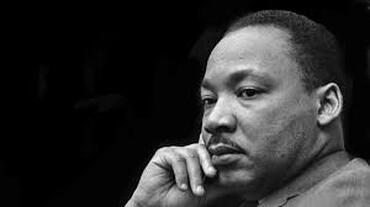
Can we be angry about the situation, and still be non-violent? As the Dalai Lama says, prayers are not enough, we must take action. We must embody sacred energies, energies lying dormant within us. We will generate levels of compassion we never knew were within our reach. We may have to come out of our shells, we may have to become better critical thinkers and political philosophers, we may have to reconsider our priorities, and even harness our anger. So be it.
As His Holiness the Dalai Lama says in his book, Beyond Religion: Ethics for a Whole World:
Similarly, even anger is not always destructive. For example, in some situations strong compassion may give rise to an equally strong sense of outrage — that is anger about an injustice. Again, feeling angry can, in the short term, make our minds more focused and give us an extra burst of energy and determination. In these ways, anger can, in certain situations, make us more effective in getting things done and in obtaining what we rightly seek. |
The Buddhist community, and their allies, have it within their capacity to catalyze this fundamental process of healing, non-violently, and without calling for a revolutionary demolishing of current institutions. This healing, or this ‘jump in evolution,’ has to take place at the profoundly deep level of what we know about human nature and our reality as social beings. Change from the inside out. It includes the “revolution of compassion” that the Dalai Lama calls for in his book, Call for Revolution. But goes further.
Non-violence, meta-ethics, and the deeper reaches of political ethos. Non-violence in social action is another key attribute that Buddhists and their allies can bring to this change process. Martin Luther King was influenced by not only Mahatma Gandhi but also by Thich Nhat Hanh. King’s adoption of non-violent civil disobedience was one of the strongest weapons he had to bring politicians to the table, much faster than if there had been a violent revolution. Non-violent demonstrations generated such incredible ethical weight that not even a cynic like Lyndon Johnson could avoid his sense of moral responsibility any longer.
We can do the same, when calling for a new system of educating leaders, a new political and economic philosophy that adheres to science, and a new mass movement seeking social change. But we can do even better. By employing compassionate psychology, a profound understanding of the roots of racism, delusions about social superiority, and callousness about the environment, we can find the best ways to reach Republican-leaning voters and find common ground. Here is where all those decades of practicing not harming others, empathy, and loving kindness to everyone, inevitably pays off. Again, not that we will be perfect. No one ever is.
Especially in this time period in the United States when the ascendency of the Republican Party has brought about the “moral rot” we cited in the first topic, a deep appreciation of the importance of ethics and moral reasoning is obvious. Buddhists who have practiced for some years may even be hyper-aware, super self-conscious of their negative thoughts. It is tricky to be fully cognizant of our intentions behind actions, the effects of karma, and the grip that the kleshas, ignorance, greed, and ill-will, have on our minds. Such is the nature of becoming awake.
But this intensified awareness of the causes and effects of our actions and thoughts begins to transform our minds, lays down what is called ‘merit’ in the Buddhist tradition, leads us to becoming more naturally ethical, and able to care for other beings with greater and greater heart. This is one way we develop our social-emotional intelligence, and it enhances our lives — in our relationships with others, in our own peace of mind, and in our discriminating awareness of who to trust and who not.
Being mindful of high ethical standards also requires us to be conscious of the cultural landscape in which the roots of the dharma are being planted. Adaptation is a natural ability in evolution and is no less important in the process of transplanting a philosophical and spiritual tradition. To be sensitive to how the cultural context receives and is affected by new concepts and teachings is another quality that Buddhists must acquire. How we embody a Buddhist ethic, and make it real in our own culture, is crucial. We are the laboratory, and we must observe if the teachings are manifesting in us. This education teaches us how to think about training leaders to be better human beings, an important link in this catalytic process of healing our society.
Of course, it is natural to have doubts that a small community can have much influence on the political scene. And yet, with enlightened leadership, many thousands of people of conscience who are fearful of the our country’s direction, may well join us. We only need to reach a critical mass. As a recent article from the BBC noted, researchers have found that only 3.5 % of the population engaged in non-violent resistance can have their desired effect.
There are, of course, many ethical reasons to use nonviolent strategies. But compelling research by Erica Chenoweth, a political scientist at Harvard University, confirms that civil disobedience is not only the moral choice; it is also the most powerful way of shaping world politics — by a long way. |
10. How Buddhist Psychology Can Illuminate the Ideology Behind the Most Dangerous Forms of Extremism
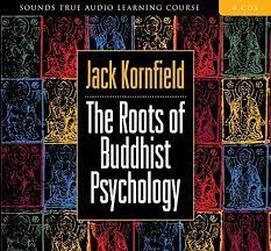
Karl Marx was certainly filled with concern for the disenfranchised workers and peasants of his time, bound in servitude to the upper classes, working in factories or farms without protection or a voice.
And even the arch-neoliberal philosophers of the last several decades, may well believe that they are closer to the truth than any other theorist when they saw they are protecting “liberty,” when really they are just promoting a value-less market, and corporations who have little obligation to fulfill social responsibility. Even the most extreme, hellish, nightmare ideologies like Hitler’s promise of the Third Reich, and his apologists like Alfred Rosenberg, still knew that they had to appeal to the lofty, good intentions of the Germanic race — for the Reich was how the German race, and by proxy the whole human race, would be purified, and saved.
But no matter what their intentions are, one after another these political theories fail because they are partial, fragmented, superficial, and/or distorted by the unconscious prejudices of their authors. Enlightenment social philosophers like Thomas Jefferson held deeply-entrenched biases about the equality of human beings. Karl Marx could not conceive of the workers becoming the oppressors in a communist state because he had no understanding of psychology, group dynamics, or evolutionary biology. Neoliberal philosophers like Friedrich von Hayek, James Buchanan, or Milton Friedman also had no understanding of transpersonal or contemplative psychology, behavioral economics, or the scientific findings on the nature of social cooperation as found in the disciplines of anthropology and social psychology. Why contemporary thinkers choose to ignore such over-whelming evidence is inexcusable, but why would they want to be disabused of their own theories, when they were having such success?
Cloudy Lenses, Fixed Mindsets, and Confusing Thought Patterns. Psychic poisons and little understanding of human nature. We can’t diagnose the cause of an illness if we don’t look deeply enough, or our vision remains cloudy. Those in the spiritual community are familiar with the concept that we perceive external reality through the lens of our belief system, our philosophical mindset. Ideologies are driven by these mindsets and belief systems. This is natural, and inevitable, because humans need an ideology, a world view, to identify with, to belong to. Such a belief system, or Weltanschauung, gives us something greater than ourselves to believe in. The temporality and impermanence of our existence is the most disturbing fact to our ego. No wonder Buddhist philosophers made such a point about embracing that transience of our ego’s identity, rather than fighting it.
Simultaneously, we are all animated — ultimately — by a spiritual inclination, a hope that in some way our self will endure beyond the grave, that we partake of some form of consciousness that transcends death. Buddhists understand this as our innermost desire to realize our Buddha nature, our unity with the Divine. But at whatever level of awareness, no matter how poor or immature it is, our belief system is essential to our lives. It holds our loyalty and sacrifice, and brings some level of spiritual security.For anyone in the spiritual community, the question is how true, how close to ultimate truth is the system’s core principles?
If one is a racist, then they perceive other races as threats, and try to twist reality and facts to justify that perception. Known in psychology as ‘projection,’ it is a well-recognized and well-documented phenomenon. It is only one of the features of how mindset prejudices our perception of reality, but it is illustrative.
When Adolph Hitler called for the creation of the Third Reich, at almost every step he used the language, iconography, and messianic appeal of a soteriological, or salvationist, vision. He offered a thousand-year reign of the superior Aryan race — basically a spiritual ideology of a utopia that would save humanity from all the impurities of ‘foreign races.’ He used the primary tool of creating a special identity and mission for his followers, as being ‘chosen’ and ‘elected’ to fulfill the destiny of history, no matter the cost. The mass rallies, the symbols, the rituals, the shutting down of all that was foreign and progressive, all helped create a religious atmosphere of belief.
Hitler made the State, the Reich, sacred, and himself its prophet. He simplified the German people’s problems and asked them to cast aside doubt and reason, and embrace faith in his new cause. He asked for their blood and sacrifice, to dedicate their children to become Nazi Youth, and celebrated everything Aryan as seriously as any cult has ever done in history.
Alfred Rosenberg, Hans Kerri, and other ideologues promoted the fusing of Christian religion and the Reich. As Wikipedia notes, Hitler wanted to take over the theology of the Church, supplanting both Catholic and Protestant creeds, with the doctrine of National Socialism. Hans Kerrl, the Minister for Church Affairs said this to submissive clergy:
“The Party stands on the basis of Positive Christianity, and positive Christianity is National Socialism … National Socialism is the doing of God’s will … God’s will reveals itself in German blood … No, Christianity is not dependent upon the Apostle’s Creed … True Christianity is represented by the party, and the German people are now called by the party and especially the Fuehrer to a real Christianity … the Fuehrer is the herald of a new revelation.’” |
American Exceptionalism. Another ideological strain on the right wing is that of American Exceptionalism, and has at times had vociferous proponents such as Dick Cheney, at his most unctuous. While at first glance this belief that America is somehow destined to fulfill a role in the advancement of the world’s civilization is tame, when it is taken to extremes it can become yet another dangerous ideology. This was evident in the build-up to the Iraq War and the propagation of the Bush Doctrine. This foreign policy justified pre-emptive military measures wherever American economic special interests were threatened.
One of the signs of a country’s political maturity is the recognition that its inflated sense of ‘mission’ is heavily distorted. Yet many in the United States continue to subscribe to this delusion of grandeur, believing that our country has a unique destiny to play in the salvation of the world. Or in Christian terms, the salvation of Christian souls. This kind of messianic delusion is especially toxic when it infects the most powerful. Those who control armies and industries and capital markets. It is sorely tempting to believe that one is divinely ordained, or at least ordained by history, to accomplish great things in the advancement of civilization, or in the fulfillment of prophecy.
In a compelling article in Rolling Stone, Alex Morriss details how Trump and his campaign solicited the religious right so that they could court the evangelic vote. In a meeting just six weeks before the election in November 2016, Trump met with leaders of the religious right and basically sold them on his promise that he would fight for their cause.
He never claimed he was a good Christian, and they never expected him to be. That is why they are never outraged by his behavior. All they want is his success in rolling back the cultural advances of liberalism and the packing of courts with conservative judges. Many prominent evangelical activists and talk-show hosts attended the meeting, and Robert Jeffress chaired it. Jeffress is the minister in charge of 14,000-member church, First Baptist Dallas, and a contributor to Fox News. . .
In Jeffress’ final argument, he reminded everyone — in apocalyptic terms — what that support would mean. “What I want to say in closing is this election is not a battle between Republicans and Democrats. It’s a battle between good and evil, light and darkness, righteousness and unrighteousness. . . . This is the last chance we have, I’m convinced, as a country to turn this country around.
